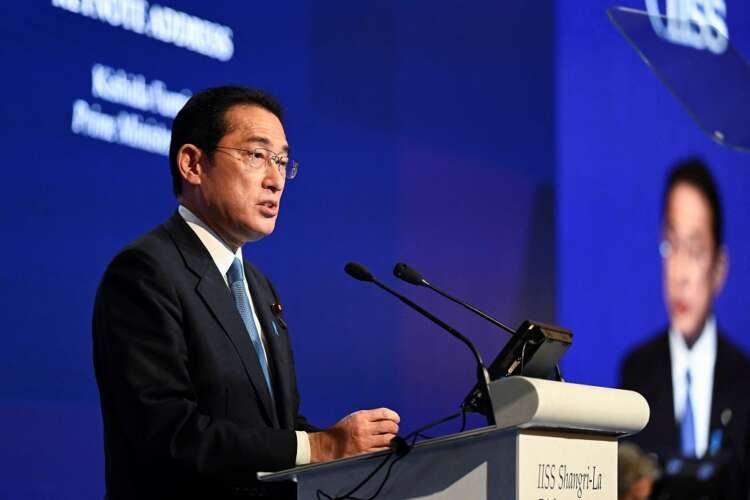At Asia security summit, Japan vows to boost regional security role


By Chen Lin and Idrees Ali
SINGAPORE (Reuters) – Japan’s Prime Minister Fumio Kishida pledged on Friday to boost its regional security presence to counter multiple threats, from China’s expansion in the South China Sea to North Korea’s nuclear missile programme.
Earlier, on the first day of the Shangri-La Dialogue in Singapore, U.S. Defense Secretary Lloyd Austin and Chinese Defence Minister General Wei Fenghe had their first face-to-face meeting.
Although both sides reiterated that they want to better manage their relationship, Beijing and Washington remained polarised over several volatile security situations, from Taiwan’s sovereignty to China’s military activity in the Pacific and Russia’s invasion of Ukraine.
After the meeting, Chinese and U.S. officials highlighted the cordiality of proceedings in a sign it could help open the door to more communication between the two militaries.
However, there was no evidence of any breakthrough on settling long-running security disputes.
Japan’s Kishida, who took office last year, said at the meeting’s keynote address that Russia’s invasion of Ukraine had shaken the “foundations of the international order”, leaving the world at a crossroads.
He said Japan would enter a new era of “realism diplomacy”, another step by Tokyo to distance itself from its post-World War Two pacifism and step out of the shadow of the United States, its main ally, to take a bigger role in regional security where it faces China, North Korea and Russia.
“We will be more proactive than ever in tackling the challenges and crises that face Japan, Asia, and the world,” Kishida said.
“Taking that perspective, in order to maintain and strengthen the peaceful order in this region, I will advance the ‘Kishida Vision for Peace’ and boost Japan’s diplomatic and security role in the region.”
Although the meeting is focused on Asian security issues, Russia’s invasion of Ukraine remains central to discussions.
The conflict, which has killed tens of thousands of people, uprooted millions and reduced cities to rubble, entered its 100th day last week.
At the U.S.-China meeting, Austin “strongly discouraged” China from providing material support to Russia for the war. In response, China’s defence spokesman said Beijing did not provide Russia with military assistance.
This year, Washington warned that Beijing appeared poised to help Russia in its war against Ukraine.
But since then, U.S. officials have said while they remain wary about China’s longstanding support for Russia in general, the military and economic support that they worried about has not come to pass, at least for now.
China has not condemned Russia’s attack and does not call it an invasion, but has urged a negotiated solution.
The bulk of Wei and Austin’s meeting was dedicated to discussing the future of Taiwan, one of the most acute sources of diplomatic tension between the world’s two biggest economic powers.
The United States is Taiwan’s most important international supporter and arms supplier, a source of constant friction between Washington and Beijing.
China, which claims self-ruled Taiwan as its own territory, has increased military activity near the island over the past two years, responding to what it calls “collusion” between Taipei and Washington.
(Reporting by Chen Lin and Idrees Ali in Singapore and Tim Kelly in Tokyo; writing by Joe Brock; Editing by Raju Gopalakrishnan)
Regional security refers to the measures taken by countries in a specific area to ensure peace and stability, often in response to threats from neighboring nations.
Realism diplomacy is a foreign policy approach that emphasizes national interests and power over ideals or ethics, often leading to more pragmatic and strategic decision-making.
The South China Sea is a critical maritime region for international trade and resources, with ongoing territorial disputes that impact regional security and relations among countries.
The U.S. plays a significant role in Asia's security through military alliances, defense agreements, and diplomatic efforts to counter threats from nations like China and North Korea.
Explore more articles in the Top Stories category











